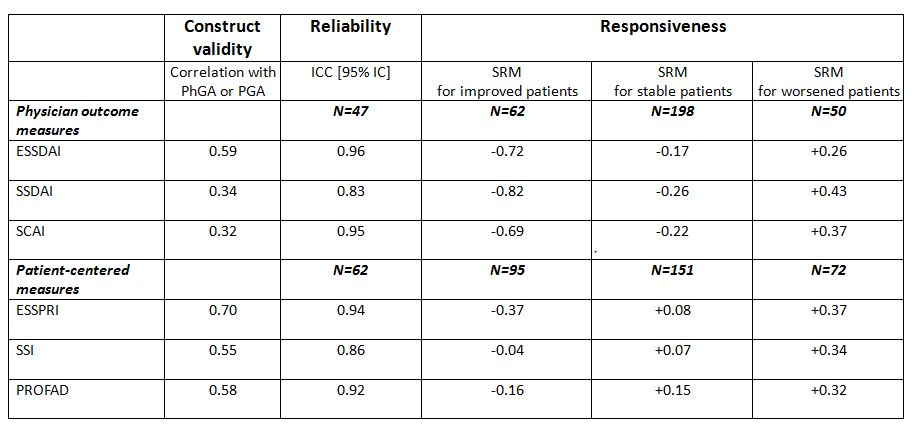Session Information
Session Type: Abstract Submissions (ACR)
Background/Purpose: To validate the EULAR scores for assessment of primary Sjögren’s Syndrome (SS): the EULAR SS Disease Activity Index (ESSDAI), the EULAR SS Patient Reported Index (ESSPRI).
Methods: Prospective international validation study with 2 visits: baseline and 6 months. At each physicians completed ESSDAI, SS disease activity index (SSDAI), Sjögren’s Systemic Clinical Activity Index (SCAI) and physician global assessment (PhGA); and patients completed ESSPRI, Sicca Symptoms Inventory (SSI), Profile of Fatigue and Discomfort (PROFAD) and patient global assessment (PGA). Construct validity (using correlations with gold standard), responsiveness (using standardized response mean [SRM]) and reliability (intraclass correlation coefficient [ICC]) were evaluated and compared between each scores.
Results: 395 patients (96% women, mean age 55.4 ± 13.7 years, 79% with anti-SSA and/or anti-SSB antibodies) from 15 countries have been included. At enrollment, 145 (37%) and 251 (64%) had, respectively, current or either current or past systemic manifestations. EULAR scores had higher correlation with gold standard than other scores (ESSDAI with PhGA: rho=0.59; ESSRPI with PGA: rho=0.70). Correlations between patient and systemic scores were very low (rho ranging from 0.07 to 0.29). All systemic scores had similar large responsiveness in improved patients. Responsiveness of patients scores was low in patient experiencing improvement of their symptoms but was significantly higher for ESSPRI compared to SSI and PROFAD (p=0.006 and 0.049 for SRM comparisons) Reliability was assessed in a subgroup of 47 and 62 patients, for systemic and patients scores, respectively. Reliability was very good for all scores.
Conclusion:
ESSDAI and ESSPRI had good construct validity, better than other scores. All scores were reliable. Systemic scores were sensitive to change in patient whose disease activity improves. Patient scores had a small sensitivity to change. However, ESSPRI was significantly better than SSI and PROFAD. The poor correlation between systemic and patients scores confirms that these 2 components are different and should be evaluated separately.
Disclosure:
R. Seror,
None;
E. Theander,
None;
J. G. Brun,
None;
M. Ramos-Casals,
None;
V. Valim,
None;
T. Dorner,
None;
X. Mariette,
None;
H. Bootsma,
None;
A. G. Tzioufas,
None;
R. Solans-Laqué,
None;
J. E. Gottenberg,
None;
E. Hachulla,
None;
W. F. NG,
None;
S. Bombardieri,
None;
R. Gerli,
None;
T. Sumida,
None;
A. Saraux,
None;
M. Tomsic,
None;
R. Caporali,
None;
R. Priori,
None;
K. Moser Sivils,
None;
A. A. Kruize,
None;
C. F. Vollenweider,
None;
C. Vitali,
None;
S. J. Bowman,
None.
« Back to 2012 ACR/ARHP Annual Meeting
ACR Meeting Abstracts - https://acrabstracts.org/abstract/validation-of-eular-primary-sjogrens-syndrome-disease-activity-and-patient-indexes/

